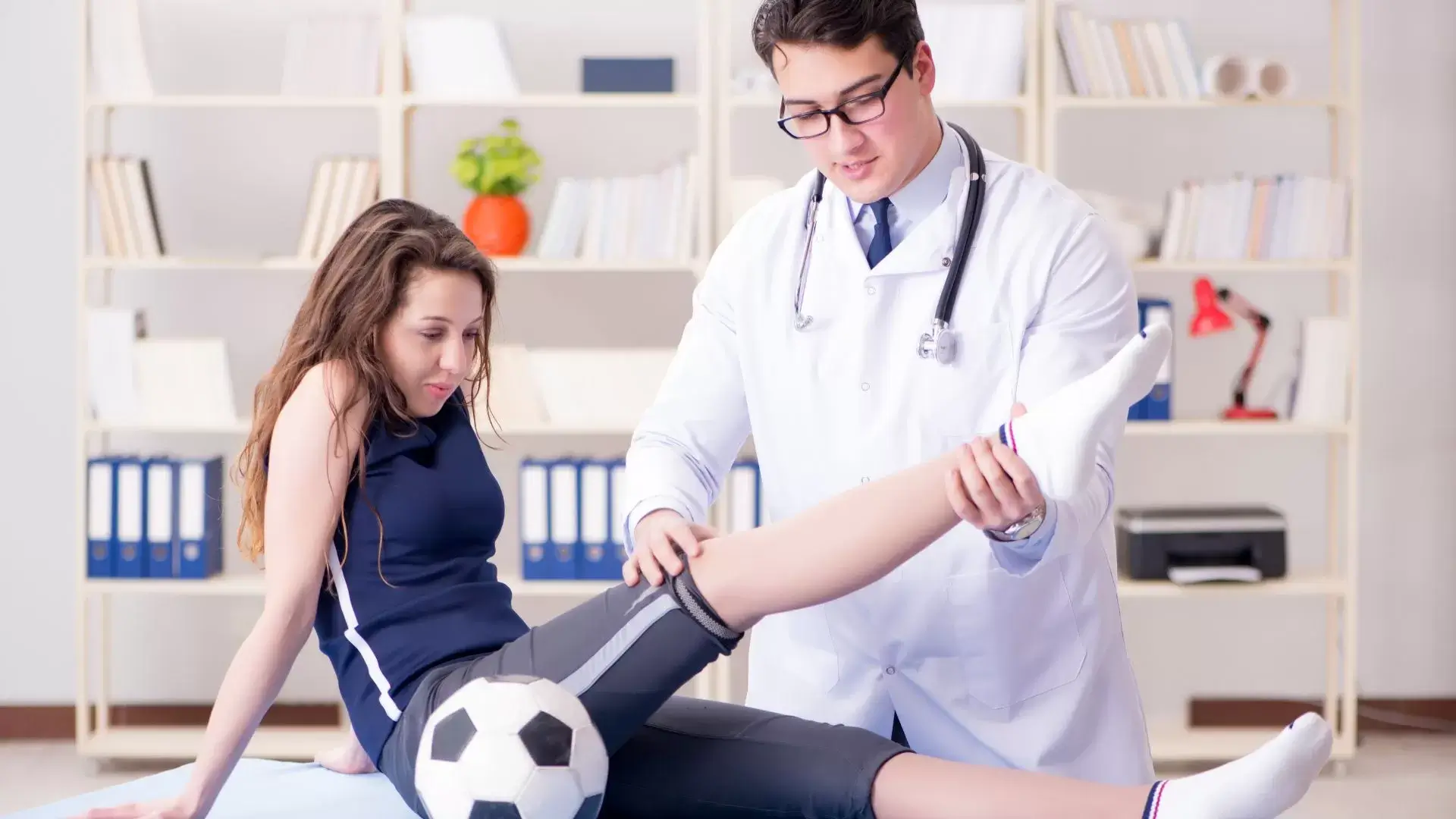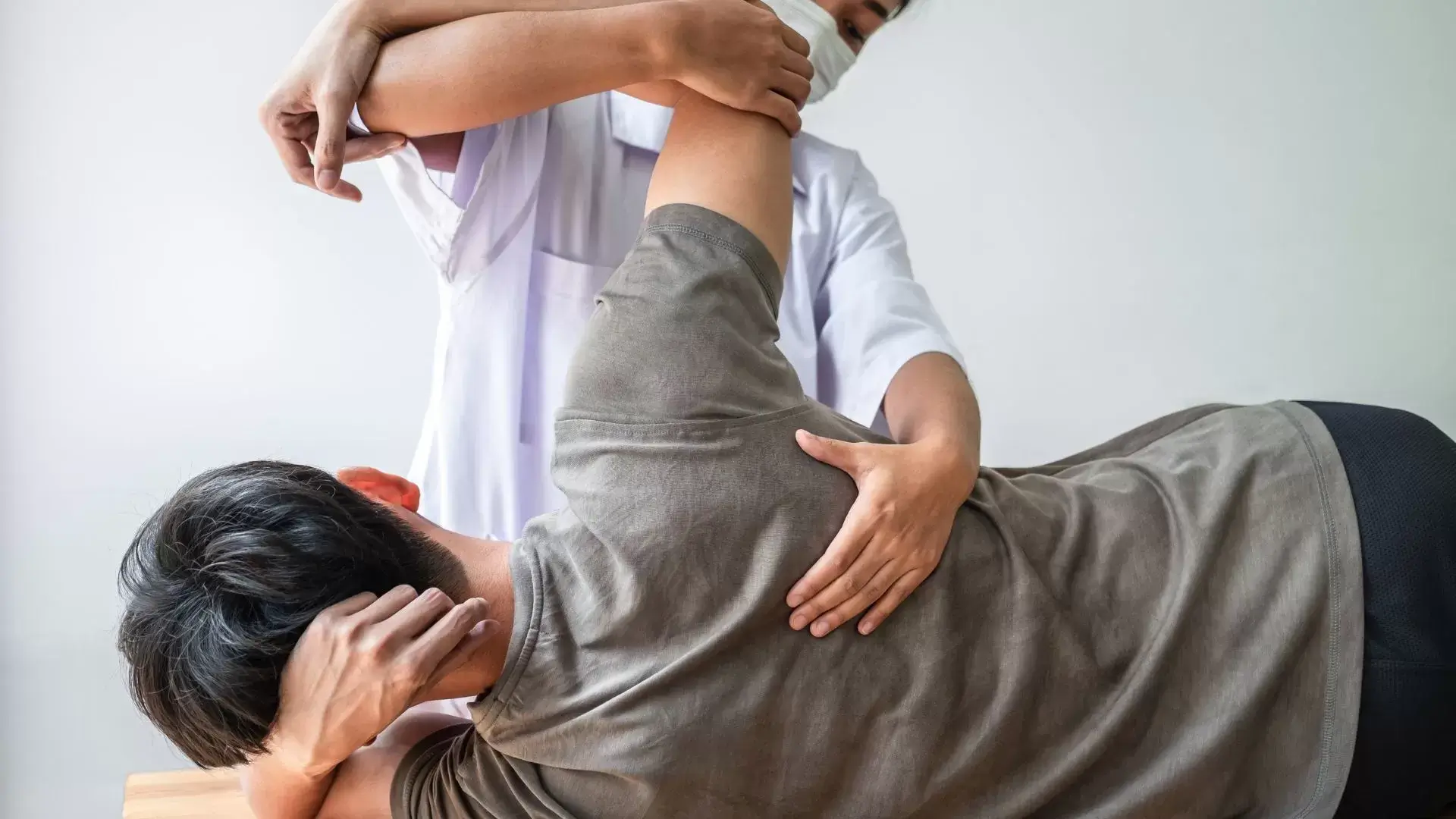Our Best Mississauga Physiotherapy & Chiropractic Clinic, we’re dedicated to providing tailored physiotherapy for sports injuries. We focus on personalized treatment plans that address each athlete’s unique needs, whether they’re dealing with acute sprains, chronic overuse injuries, or post-surgical rehabilitation. Our evidence-based techniques help restore strength, flexibility, and endurance, ensuring a safe return to sport. We also emphasize injury prevention strategies to minimize future risks. By fostering open communication, we set realistic recovery goals and monitor progress together. There’s much more we can share about how we can help you regain peak performance and health effectively.

At Mississauga Physio Chiro Clinic, we specialize in providing thorough physiotherapy and chiropractic services designed to help athletes recover from injuries and enhance their overall performance. Our experienced team is dedicated to delivering personalized sports injury treatment tailored to each athlete’s unique needs. We recognize that both acute and chronic injuries can greatly impact an athlete’s ability to perform, and we’re here to support you through every step of your rehabilitation journey.
Our all-encompassing sports rehabilitation programs focus on addressing various types of injuries, including soft tissue injuries, to promote effective recovery. We employ evidence-based techniques and practices, integrating rehabilitation exercises that promote strength, flexibility, and endurance. Additionally, we emphasize injury prevention strategies to help athletes avoid future setbacks.
Through our specialized sports therapy, we aim to facilitate athletic recovery efficiently, empowering you to return to your sport with confidence. We believe in fostering a supportive environment that encourages open communication and collaboration, making sure you feel heard and acknowledged throughout your treatment. Together, we can work towards achieving your performance goals while prioritizing your health and well-being.
Understanding the causes and types of sports injuries is vital for effective prevention and treatment, as it allows us to tailor our rehabilitation strategies to meet each athlete’s specific needs. Sports injuries can arise from a variety of factors, including improper technique, inadequate warm-ups, and insufficient conditioning. Common athletic injuries include sprains and strains, which often occur when ligaments or muscles are overstretched. Fractures are another serious concern, frequently resulting from high-impact collisions or falls.
We also see a significant number of overuse injuries, which develop gradually due to repetitive stress on the body. These can be particularly challenging to diagnose, as they may not present immediate symptoms. Injury diagnosis plays a key role in identifying the root cause of pain and tailoring a treatment plan.
Physiotherapy plays an essential role in helping athletes recover from sports injuries by providing tailored rehabilitation strategies that address individual needs and promote healing. When we face dislocations, torn ligaments, or muscle tears, our physiotherapy team develops a thorough injury management plan. This plan not only focuses on immediate recovery but also emphasizes post-injury rehabilitation, making sure we regain strength and function.
Incorporating techniques from sports medicine, we engage in targeted strength training and sports-specific training to prepare for a safe return to activity. By focusing on joint injuries and their unique challenges, we help athletes rebuild confidence in their bodies. Our approach is empathetic, understanding that recovery can be both physically and mentally taxing.
As we progress through rehabilitation, we continuously evaluate our performance and adjust our strategies to meet evolving needs. This guarantees effective sports recovery and minimizes the risk of re-injury. With a collaborative effort, we can navigate the complexities of recovery, allowing us to reclaim our passion for sports and maintain our active lifestyles. Ultimately, physiotherapy is a cornerstone of our journey back to peak performance.
In our journey of recovery from sports injuries, treating sprains, strains, and soft tissue injuries effectively is vital for restoring function and preventing future complications. Conditions like ankle sprains, hamstring strains, and groin strains can greatly impact our mobility and overall performance. Through personalized physical therapy, we can address these injuries with targeted mobility exercises that promote healing and strength.
Bracing for injuries, when appropriate, can provide support during the recovery process, allowing us to safely engage in sports conditioning. Our physiotherapists guide us through tailored return-to-sport programs, making certain we rebuild our strength and confidence before re-entering competitive activities.
Additionally, we must be mindful of other related issues, such as shoulder impingement, which can arise from improper movement mechanics. Addressing these underlying factors plays a vital role in our rehabilitation. By taking a thorough approach to treatment, we not only heal from our current injuries but also equip ourselves with the knowledge and tools needed to prevent future ones, including serious injuries like an ACL tear. Together, we can guarantee a smoother and more effective recovery journey.

Recovering from ligament injuries, particularly ACL and meniscus tears, requires a structured rehabilitation plan that emphasizes gradual progression and strength building to restore function and prevent re-injury. As we commence this journey together, it’s essential to understand that each phase of rehabilitation plays an important role in addressing knee injuries effectively.
Our first focus is on initial rehabilitation, where we prioritize pain management and swelling reduction through orthopedic care. We’ll incorporate flexibility exercises to improve range of motion, setting a solid foundation for further progress. Once we establish a baseline, we’ll shift to strength training, targeting the muscles surrounding the knee to enhance stability and support.
Throughout this process, we’ll draw on insights from sports injury research and sports biomechanics to tailor our approach, ensuring it’s specific to each athlete’s needs. Athletic training becomes key as we gradually introduce sport-specific movements, preparing you for a safe return to your activity.
Addressing shoulder injuries, particularly rotator cuff tears and dislocations, requires a thorough approach that focuses on restoring function and alleviating pain. Our physiotherapy protocols begin with a detailed assessment of the rotator cuff injury and any related injury risk factors. We prioritize tailored exercises that enhance strength and flexibility, aiming to support ideal athletic performance.
In the acute phase, we often employ heat therapy and ultrasound therapy to reduce inflammation and promote healing. As we progress, we incorporate kinesiology taping to provide additional support and stability, allowing for better movement mechanics. For those facing severe injuries, we may collaborate with sports surgery specialists to guarantee extensive care.
Furthermore, it is crucial to recognize that shoulder injuries can sometimes lead to compensatory back injuries. We address these interconnected issues holistically to make sure that we’re not just treating the symptoms but also preventing future injuries. By fostering open communication and empathy, we guide our clients through each step of their recovery journey, empowering them to return to their desired level of activity and enhancing their overall well-being. Together, we can navigate the road to recovery effectively.
Understanding the complexities of lower limb injuries—especially those affecting the knees, ankles, and feet—allows us to create a thorough care plan that promotes healing and restores mobility. Injuries like runner’s knee, patellar tendinitis, and shin splints can greatly impact an athlete’s performance and quality of life. By addressing these conditions holistically, we can help our clients return to their active lifestyles.
In our approach, we focus on personalized rehabilitation strategies that include targeted exercises, manual therapy, and education on proper biomechanics. For instance, we often recommend specific strengthening exercises for the knees to alleviate stress on the patellar tendon. In addition, we address common ankle injuries, such as Achilles tendonitis, through a combination of stretching and strengthening routines.
Moreover, we emphasize the role of sports nutrition in recovery, ensuring that our clients are fueling their bodies appropriately to support healing. We also integrate cryotherapy techniques to reduce inflammation and pain associated with foot injuries. Through our all-encompassing care approach, we aim to empower athletes to overcome lower limb injuries and prevent future occurrences, fostering a sustainable path to recovery and enhanced performance.
While lower limb injuries often dominate discussions in sports rehabilitation, head and neck injuries require equally attentive recovery solutions to confirm athletes can safely return to their sport. Concussions, neck injuries, and spinal injuries are serious concerns that we must address with care and expertise.
Our approach to recovery solutions begins with thorough assessments, identifying the specific type of injury, whether it’s a concussion or cartilage damage. We then create personalized physiotherapy plans that incorporate gentle exercises to restore strength and flexibility. This could include targeted treatments for associated wrist sprains or calf strains that may arise from compensatory movements.
Education also plays an essential role in our recovery process. We make certain athletes understand the importance of respecting their bodies’ signals, especially when dealing with head injuries. Gradual return-to-play protocols are imperative to avoid re-injury.

Effective post-injury rehabilitation is essential for athletes looking to not just recover, but also enhance their performance and prevent future injuries. Through focused physiotherapy, we can address specific sports injuries like tennis elbow, golfer’s elbow, stress fractures, plantar fasciitis, hip injuries, and thigh injuries. This tailored approach not only aids in healing but also optimizes our physical capabilities.
During rehabilitation, we work closely with physiotherapists to develop personalized exercise programs that strengthen weakened muscles, improve flexibility, and restore range of motion. By incorporating functional exercises, we can simulate the movements required in our respective sports, ensuring we’re not just recovering, but also building resilience. This holistic approach helps in mitigating the risk of re-injury.
Moreover, the psychological aspect of rehabilitation shouldn’t be overlooked. By fostering a positive mindset and focusing on gradual progress, we can boost our confidence and motivation to return to peak athletic performance. Ultimately, effective rehabilitation isn’t merely about recovery; it’s about coming back stronger and more prepared to face the challenges of our sport. By committing to this process, we can greatly enhance our athletic performance and enjoy a longer, injury-free career.
Building on our rehabilitation efforts, proactive physiotherapy plays an essential role in preventing sports injuries before they occur. By identifying potential risk factors and implementing tailored programs, we can markedly reduce the likelihood of injuries such as hand fractures and finger dislocations.
Our team at 1834 Lakeshore Rd W unit 6C, Mississauga, ON L5J 1J7, understands that every athlete’s needs are unique. We focus on strength training, flexibility exercises, and sport-specific techniques to enhance performance and resilience. Through thorough assessments, we can pinpoint areas of weakness and address them proactively.
In addition to physical training, we emphasize education about proper techniques and body mechanics. This knowledge empowers athletes to make safer choices during their practices and competitions. We’re always available for questions and support; feel free to reach us at (647) 372-1209.
Overuse and chronic sports injuries can greatly impact an athlete’s performance and overall well-being, but our physiotherapy approach aims to provide relief and restore function through targeted treatment plans. We recognize the frustration and limitations these injuries can impose, and that’s why we focus on individualized assessments to determine the root cause of the pain.
Our team employs various modalities, including manual therapy, ultrasound, and specific exercises, tailored to each athlete’s unique needs. By addressing the underlying issues, we work to alleviate pain and improve mobility, allowing athletes to return to their sport safely and effectively. We also emphasize education, helping athletes understand their injury and the importance of pacing their training to prevent future issues.
Open communication is key in our practice; we encourage our clients to share their concerns and progress with us. This collaborative approach not only empowers athletes but also fosters trust and accountability. With our dedicated support, we can guide athletes through their recovery journey, ensuring they regain their strength and confidence to perform at their best. Together, we can manage and overcome the challenges of overuse and chronic injuries.
We recognize that enhancing strength and flexibility is crucial for athletes looking to prevent injuries and improve their performance, which is why our tailored training programs focus on individual needs and goals. Each athlete is unique, and we take the time to assess their current physical condition, sport-specific requirements, and any previous injuries to create a thorough plan.
Our programs incorporate a variety of exercises designed to build muscular strength and improve flexibility. We use techniques such as resistance training, dynamic stretching, and mobility drills to guarantee a well-rounded approach. By progressively increasing the intensity and complexity of the workouts, we help athletes safely push their limits while minimizing the risk of injury.
Moreover, we realize that mental resilience is just as important as physical strength. We encourage open communication throughout the training process, allowing athletes to express any concerns or discomfort. This collaborative approach fosters a supportive environment, promoting both physical and psychological well-being.
Ultimately, our goal is to empower athletes with the tools they need to excel in their sport while maintaining peak health. With our tailored training programs, we’re committed to helping them achieve their peak performance.
Innovative physiotherapy methods like kinesiology taping and cryotherapy are transforming how we approach sports injury recovery and prevention. These techniques not only offer immediate benefits but also support long-term healing and performance enhancement.
Kinesiology taping involves applying elastic therapeutic tape to the skin, which helps to stabilize injured muscles and joints without restricting movement. By promoting better circulation and lymphatic drainage, it can reduce swelling and pain. We’ve seen our athletes regain confidence and functionality more quickly with this method, allowing them to return to their sports sooner.
On the other hand, cryotherapy employs extreme cold to alleviate inflammation and pain. Whether through ice packs or whole-body cryo chambers, this technique helps in reducing muscle soreness following intense workouts or injuries. We appreciate how it speeds up recovery, allowing athletes to maintain their training regimens without long interruptions.
Together, these innovative methods not only enhance recovery but also empower our clients, giving them a sense of control over their healing process. As we integrate these techniques into our practice, we’re committed to providing effective, empathetic care tailored to each individual’s needs.
Integrating sports nutrition and conditioning is crucial for achieving holistic recovery, as these elements work together to optimize an athlete’s performance and overall well-being. When we focus on proper nutrition, we’re not just fueling our bodies; we’re also enhancing our recovery processes. Nutrient-dense foods provide the necessary vitamins and minerals needed for healing, while adequate protein intake helps repair and build muscle tissue.
Conditioning, on the other hand, plays a significant role in maintaining and improving our physical capabilities. By incorporating tailored conditioning programs, we can strengthen weakened areas and improve overall endurance, which is essential for preventing future injuries.
It’s important to remember that recovery isn’t just physical; it’s also mental. Balanced nutrition and conditioning routines can boost our mood and energy levels, contributing to a more positive outlook during rehabilitation.
Thorough physiotherapy for sports injuries in Mississauga offers tailored treatment plans designed to address individual needs and promote effective recovery. By reaching out to skilled physiotherapists, we can guarantee an all-encompassing approach that incorporates assessment, rehabilitation, and prevention strategies. Our first step involves a detailed evaluation of the injury, allowing us to identify the root cause and develop a personalized plan that suits our specific circumstances.
We understand that every athlete’s journey is unique, and that’s why we emphasize open communication throughout the process. We’ll work collaboratively to set realistic goals, monitor progress, and make necessary adjustments along the way. This partnership not only enhances our recovery but also fosters a sense of empowerment.
Moreover, our physiotherapy services in Mississauga extend beyond just treating injuries. We focus on strengthening the body, improving flexibility, and educating ourselves about injury prevention techniques, guaranteeing we’re equipped to minimize future risks. By reaching out for all-encompassing physiotherapy, we’re taking a proactive step towards not only recovering from our injuries but also enhancing our overall performance in sports. Let’s prioritize our health and well-being together. Contact us now!
What makes the city of Mississauga a vibrant hub for both residents and athletes alike is its rich blend of cultural diversity, modern amenities, and a strong commitment to community health and wellness. As we explore the city, we find that Mississauga boasts an extensive network of parks, sports facilities, and recreational programs designed to engage individuals of all ages and skill levels.
The city’s population represents a wide range of backgrounds, fostering an inclusive atmosphere where everyone can feel welcome. This diversity enriches community events and sports activities, making them more engaging and accessible. Furthermore, Mississauga’s commitment to health can be seen in its various initiatives aimed at promoting physical activity, wellness, and preventative care.
For athletes, the availability of exceptional physiotherapy services is essential in ensuring peak performance and speedy recovery from injuries. With numerous clinics staffed by qualified professionals, we have access to personalized treatment plans tailored to our unique needs. As we embrace the active lifestyle that Mississauga encourages, we can confidently pursue our sports endeavors, knowing that thorough care is just around the corner.

When we contemplate a typical physiotherapy session for sports injuries, it usually lasts between 30 to 60 minutes. This duration allows us to thoroughly assess the injury, provide treatment, and discuss rehabilitation strategies. We recognize that time is valuable, so we aim to maximize each session’s effectiveness. By focusing on individual needs, we guarantee that our approach is tailored, helping us achieve the best recovery outcomes together.
When we attend physiotherapy sessions, it’s important to wear comfortable, loose-fitting clothing that allows for easy movement. We should opt for attire that won’t restrict our range of motion, like athletic wear or stretchy fabrics. Footwear matters too; supportive sneakers are ideal. By dressing appropriately, we can focus on our treatment without distractions, ensuring we get the most out of each session. Comfort is key for our overall experience and progress.
When considering whether physiotherapy treatments are covered by insurance, we should check our specific insurance policies. Many plans do provide coverage for physiotherapy, but the extent can vary widely. It’s essential to understand our benefits, including any required referrals or limits on the number of sessions. We recommend contacting our insurance provider directly to clarify what’s included, ensuring we’re informed before starting our treatments.
When undergoing physiotherapy, we often wonder if we can continue playing sports. Generally, it’s possible, but it depends on our specific injury and the advice of our physiotherapist. They’ll assess our condition and provide guidelines on activity levels to guarantee we don’t exacerbate the injury. It’s essential to communicate openly with our therapist about our sports involvement, so we can strike a balance between recovery and staying active.
When we’ve sustained an injury, it’s essential to evaluate our symptoms. If we’re experiencing persistent pain, swelling, or reduced mobility, it might be time to contemplate physiotherapy. Listening to our bodies is key; if we’re struggling with daily activities or sports performance, seeking professional help can provide the guidance we need. Consulting a healthcare provider can help us determine the best course of action for recovery and rehabilitation.
Reach out to us today to book an appointment or learn more about our services. Our friendly team is here to answer your questions and help you take the first step toward improved health and wellness.
(647) 372-1209

At our “Mississauga Physio Chiro Clinic”, we are dedicated to providing personalized care that addresses the root cause of your discomfort. With a team of experienced physiotherapists and chiropractors, we focus on restoring your mobility, relieving pain, and enhancing your overall well-being.